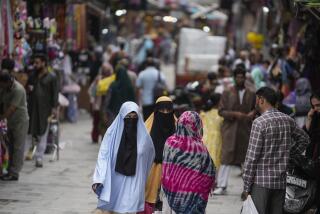India Takes Over 3 States Run by Fundamentalists
- Share via
NEW DELHI — Stepping up a controversial crackdown in the wake of last week’s religious bloodshed, Prime Minister P.V. Narasimha Rao’s Cabinet late Tuesday dismissed three elected state governments controlled by Hindu fundamentalists and imposed direct rule from the capital.
The dismissals, combined with mass arrests since the weekend of more than 2,660 members of five newly banned extremist organizations, are the strongest moves the embattled prime minister has made yet to restore stability in the riot-torn country and to defuse dissent within his own party.
After a marathon meeting, Rao’s Cabinet voted shortly before 11 p.m. to order direct civil rule in Madhya Pradesh, Rajasthan and Himachal Pradesh in northern India. All three states were ruled by the Bharatiya Janata Party, a right-wing Hindu revivalist party that is the formal opposition in Parliament and India’s second-largest political party.
The government blames the BJP, as the Hindu party is called, for inciting the Dec. 6 attack by Hindu zealots on a disputed 16th-Century Muslim mosque in Ayodhya. The mosque’s destruction sparked Hindu-Muslim riots across the country last week that left more than 1,200 dead, 4,000 injured and millions of dollars of damage.
Most of the country was returning to normal Tuesday, although several outbreaks of arson and violence were reported. Army, paramilitary and police forces patrolled widely, but curfews in most areas were relaxed.
The dismissals of state governments were a sharp setback for the BJP, which won control of four major states in the so-called Hindi Belt of northern India in 1991 state elections. The government dismissed the fourth BJP government, in Uttar Pradesh state, where Ayodhya is located, several hours after the mosque was attacked. Top BJP leaders were also quickly arrested.
BJP leaders reacted to the government action, calling it “a declaration of war against democracy.”
The dismissals also appeared to be a setback for Rao, who is often criticized as indecisive and who appeared to cave in to pressure from his chief rival for power in the Congress Party, Arjun Singh, the human resources development minister. Singh had publicly called for Rao to move more decisively against BJP-ruled states.
The government said the chief reason for its action was that the chief ministers of all three states were members of banned Hindu organizations aligned with the BJP. Police have made widespread arrests, closed offices and frozen bank accounts of the banned groups, two of which are Muslim.
The impact on Rao’s government was difficult to gauge. Analysts said Rao will be forced to compromise more with leftist and Communist groups in Parliament, since the remaining right-wing BJP members will withdraw any support from the government. That may make Rao weaker and less able to push economic reforms that have been the major achievement of his 18-month administration.
More to Read
Sign up for Essential California
The most important California stories and recommendations in your inbox every morning.
You may occasionally receive promotional content from the Los Angeles Times.














